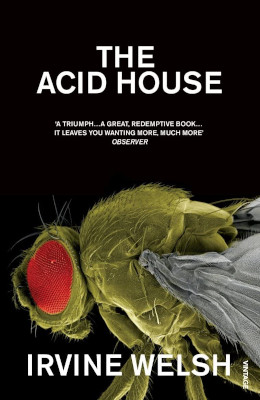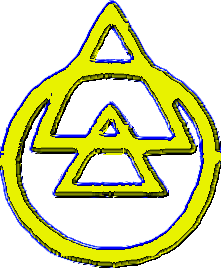|
ACID
HOUSE: Irvine Welsh

From the author of Trainspotting, this is a collection of
short stories culminating in a novella, and it's written
literally in thick, low-bro Scottish slang with words like
“bairn” for baby and “radge” for an edgy person. It was hard
to get into at first and so I rewatched Trainspotting and
looked up some short YouTube films with low-class Edinburgh
accented actors. After some time, the accents started to flow
out from the pages and into my brain and images of run down
flats in bleak working class suburbs began to fill my head.
The characters in the book are mostly despicable, yet they
also convey so much about the fragility and desperation of the
human condition. I was drawn in deeply to each story and
somehow, despite how bleak each universe was, I still felt
somewhat affectioned to the characters for being so real. And
the bleakness was balanced out by the brilliant humour, which
had me laughing out loud on many occasions, like when one of
the characters becomes a human fly.
The book opens with a story about a trans woman and it was a
very brutal characterization including many intense and
disturbing sex scenes. Many more stories were to follow
including ones where a young junkie hides his addiction from
his grandma only to realize that she herself is also an
addict, a man films his own suicide, and a wife keeps her
husband's animate severed head on display and cuckolds for
him. In one of the most hilarious stories Welsh gives
Hollywood stars Madonna and Kim Basinger Edinburgh accents and
has them crudely sizing up the bodies of working class men in
a magazine.
I don’t want to give too much away about the main story, Acid
House, though it‘s a rather brilliant LSD mishap taken to the
extreme. Welsh really managed to craft something unique,
bizarre and gut busting.
I was left me wondering if Edinburgh really was that trashy,
and the answer I got from the internet and a man from
Edinburgh who came into my work one day was: yes. It was the
AIDS capital of Europe and seedy as fuck. So however painful
it was to read at times, it does serve as a cultural cache.
And however upsetting many of the character's depictions are,
it seems that they were true to the reality of what Welsh was
surrounded by in his youth.
As I got near the end, I came an uncomfortable place where I
couldn’t stop reading the book yet I was also eager to finish
it and go find a teddy bear to hug. This book will chew all of
the skin and flesh off of your bones and leave you lying on
the ground in a pool of your own goo, so be careful.
I wasn’t aware of some of the controversy directed at Welsh,
though as I got deeper into the novel, I began to suspect that
his writings wouldn’t sit well with many in the current
culture that is increasingly moving towards greater
sensitivity around how marginalized people are depicted and
represented.
I found myself conflicted many times in reading intensely
cruel depictions of women, trans and BIPOC characters - and
after reading the book I found out that Welsh created a whole
documentary called “Offended” defending an artists right to
express themselves freely. He also spoke out against an
anti-hate bill being passed in Scotland.
I would put Welsh in the same category as someone like Steve
Albini, in that the art that he creates is meant to be
provocative and reflect on the often brutal realities of human
existence and it’s not meant as a personal condonement of such
brutalities. And it seems that Welsh is deeply aware of how
toxic masculine culture can be, and there is nothing
celebratory in his depictions of dissafected young White men
in his books: nearly all are tormented souls and fraying at
the edges. At the same time, I think there's a distinction
between reflecting on hatred in society, whatever form it may
take, and then actively promoting it. And unfortunately there
are many people in the world who are using the banner of free
speech to actively promote hatred towards others - hence the
need for anti-hate laws.
Welsh himself is quoted as saying: “The sad indictment of us
as a society is we’ve not been able to mature enough
societally to kind of get on with it ourselves and to sort of
police ourselves.”
In
my heart I wish that humans were collectively intelligent and
discerning enough to handle unlimited freedoms. Yet in my
experiences thus far, that hasn’t been the case. In online
forums where unlimited freedoms are given, things seems to
degenerate pretty quickly, and those who are small minded and
wish to restrict the freedoms of others tend to dominate. So
many people want the freedom to spread hate, the freedom to
destroy nature, the freedom to rape, the freedom to abuse and
the freedom to take away the freedoms of those who disagree
with them.
All over the world there is rape, genocide, murder, racism,
sexism, homophobia, poverty and displacement, and Irvine Welsh
feels that the biggest affront to freedom is “cancel culture”?
Cancel culture isn’t the problem. Rape, abuse and racism are
the problems. Why aren’t more people pissed off about how
little accountability there is from rapists and pedophiles? Or
the fact that genocides are still occurring all over the world
as people scrap over land and resources? Resources that are
mainly funneled into excessive Western lifestyles. Why are
“wokists” considered such a huge threat by so many? I mean I
personally find it annoying to be called out unfairly by ditzy
middle class white girls, as has happened to me before, but
it’s not as scary as being violently raped by a stranger and
left in a ditch.. or having soldiers come into my home and
shoot my family members in front of me.. or starving to
death.. or having my village flooded – those would be real
infringements upon my freedoms. It’s hard not to see Welsh’s
position as quite entitled.
At the same time, I do see how woke culture often misdirects
itself at the most low hanging fruit, like Irvine Welsh who I
believe is an intelligent and sensitive artist who in many
passages of Acid House shows a lot of humanity towards the
queer and female characters. He’s not the problem, he’s just
laying it all out for everyone to see. There is terrible
bigotry and misogyny being propagated by men like Donald Trump
and Andrew Tate and I think taking people like that on is far
more impactful than going after people like Welsh.
So how can we differentiate between legitimate art and works
that deserve to be cancelled? In the same way that humans are
not able to handle the responsibility of true freedoms, they
are likely not collectively responsible enough to be able to
discern between satire, art and sincere hate speech.
I really don't have the answers to any of these questions,
they’re open ended and fluid. I’m glad that the younger
generations are more sensitive to each other's feelings than I
was when I was growing up and I have a lot to learn from them.
I’m glad to be alive during the MeToo movement and I’m glad
that many people including myself are waking up the reality of
how fucked up the world is and are starting to do something
about it, and I look forward to more positive changes in the
world.
As for this book, it’s a dark portal that pulled me under for
a spell and I’m glad that I finally managed to make it through
one of Welsh’s books as it’s something I’ve been wanting to do
since the 90’s when he first became super popular. I
feel like I went through some kind of rite of passage.


|
